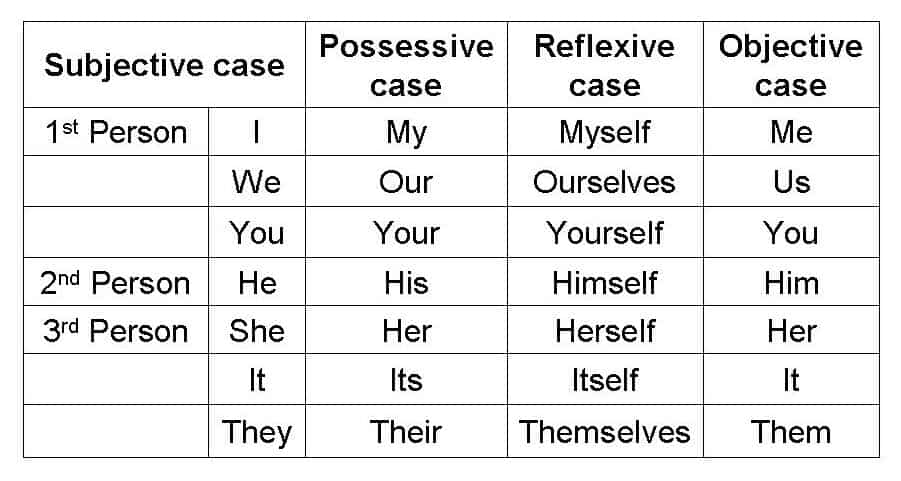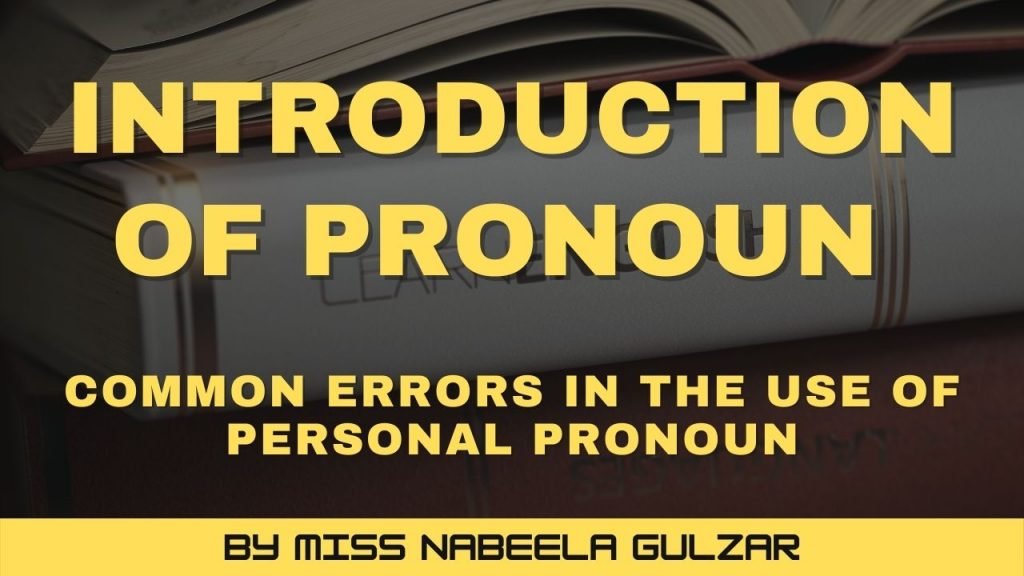Introduction of Pronouns and Common Error in the use of the Personal Pronoun
Pronoun
A word that is used to avoid the repetition of a noun is called pronoun.
As: I, We, He, You, This, Who, It, etc.
1st Kind Of Pronoun
Personal Pronoun(Introduction)
A pronoun that expresses a distinction of person.
Such as
I, We, You, He, She, It, They

Common Errors in the use of Personal Pronoun
The use of subjective and objective forms of pronouns.
1. The complement of the verb “to be” when is expressed by a personal pronoun should be in the subjective form.
I, we, you, he, she, it, they. (subjective case)
Me, our, you, him, her, it, them. (Objective case)
Examples:
1. It is them. (Incorrect)
It is they. (Correct)
2. It is me who is ill. (Incorrect)
It is I who am ill. (Correct)
3. It is him who is a thief. (Incorrect)
It is he who is a thief. (Correct)
2. When pronouns are used with “than, or as” to express comparison, usually we use the subjective form of the pronoun. However, at one or two places, we use the objective form of the pronoun.
Examples:
1. I am taller than he. (Incorrect)
I am taller than him. (Correct)
2. I am as happy as he. (Incorrect)
I am as happy as him. (Correct)
3. He is stronger than all of we. (Incorrect)
He is stronger than all of us. (Correct)
Use of objective form:
3. The objective form of the pronoun is used after “Let” and “between”.
Examples:
1. Let you and I go there. (Incorrect)
Let you and me go there. (Correct)
2. Between you and I, he is a religious person. (Incorrect)
Between you and me, he is a religious person. (Correct)
3. Let I go for a walk. (Incorrect)
Let me go for the walk. (Correct)
4. If both and all are followed by then, we use the objective form of the pronoun.
Example:
1. He is taller than both of we.(Incorrect)
He is taller than both of us. (Correct)
2. He is kinder than all of they.(Incorrect)
He is kinder than all of them. (Correct)
3. She is more intelligent than both of they.(Incorrect)
She is more intelligent than both of them. (Correct)
5. The objective form of the pronoun is used after real verbs.
Examples:
1. He asked I a question. (Incorrect)
2. I love she more than her daughter. (Incorrect)
I love her more than her daughter. (Correct)
6. When two pronouns are connected with “and” and one of them is in the first person (I, We) it is given preference to all pronouns while writing the object of the sentence. If there is any possessive case change it to ‘our”. In the absence of (I, We) the second person(your) is given preference.
EXAMPLES
1. You and I have done your work.(Incorrect)
You and I have done our work. (Correct)
2. You and Ahmed have done their task. (Incorrect)
You and Ahmed have done your task. (Correct)
7. Don’t use the apostrophe (‘) with its and yours.
Your’s sincerely.
Yours sincerely.
8. The sequence of pronouns in a sentence is as follows :
For good deeds. (You, he and I)
For bad deeds. (I, he and you)
Examples:
1. I, you and he went to say prayers.(Incorrect)
You, he and I went to say prayers. (Correct)
2. You, he and I stole a book. (Incorrect)
I, he and you stole a book. (Correct)
3. I, he and you are friends.(Incorrect)
You, he and I are good friends. (Correct)
Hopefully, your concept about Pronouns and Common Error in the use of the Personal Pronoun is clear now, This lecture is part of the whole series of English Grammar by Miss Nabila Gulzar, For Other Lectures Click Here also We have an Essay on every topic, Check the complete list here. If you are Studying in Matric Free Video Lectures of Maths, Physics and English are here, and if we got you covered for I.COM Business Maths also.







